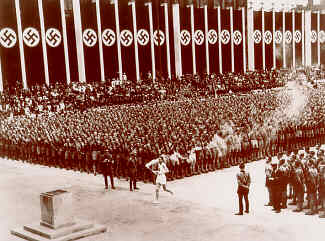|
|
|
|

 The last of 3,000 runners who carried the Olympic torch from Olympia, Greece, arrives in the Lustgarten in Berlin to light the Olympic Flame and start the 11th Summer Olympic Games. —USHMM #21674/Bettmann/CORBIS
|
| For two weeks in August 1936, Adolf Hitler's Nazi dictatorship camouflaged its racist, militaristic character while hosting the Summer Olympics. Minimizing its antisemitic agenda and plans for territorial expansion, the regime exploited the Games to impress many foreign spectators and journalists with an image of a peaceful, tolerant Germany. Having rejected a proposed boycott of the 1936 Olympics, the United States and other western democracies missed the opportunity to take a stand that contemporary observers claimed might have restrained Hitler and bolstered international resistance to Nazi tyranny. After the Olympics, Germany's expansionism and the persecution of Jews and other "enemies of the state" accelerated, culminating in World War II and the Holocaust. |
|
The Museum’s exhibitions are supported by the Lester Robbins and Sheila Johnson Robbins Traveling and Special Exhibitions Fund, established in 1990.
|
